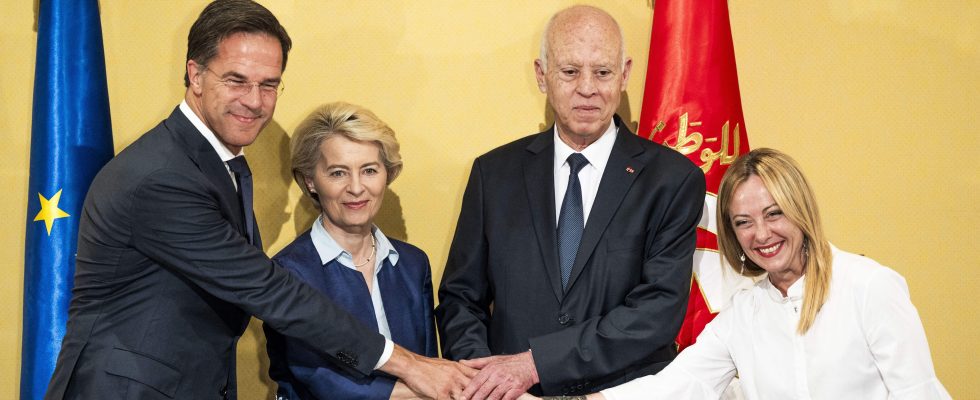Giorgia Meloni, the head of the Italian government, shows a big smile. At his side, Mark Rutte, Dutch Prime Minister, and Ursula von der Leyen, head of the European Commission, also satisfied. Only Tunisian President Kaïs Saïed maintains a stern appearance. It is July 16, 2023, in Tunis, and representatives of the European Union have traveled in large numbers to finalize a “strategic partnership” with Tunisia. The result is envelopes of several million euros: 105 million to fight against irregular immigration, as well as 150 million in direct aid to help the country face its serious economic difficulties. Added to this is a certain number of aid already planned before the announcement, of the order of more than 80 million. For the EU, and in particular the head of the Italian government, who had made the migration issue the central element of its policy, this alliance comes from the need for a reliable partner in the fight against illegal immigration. The agreement, the concrete terms of which have not yet been implemented, recalls that signed in 2015 with Turkish President Recep Tayyip Erdogan. At the time, Europe was faced with the largest wave of migrants in recent history, coming from war-torn Syria.
“But it’s 4 billion that the EU then pays to Turkey,” recalls Pierre Vermeren, professor of history at Paris I and specialist in the Maghreb. What the mid-July photo foreshadows is the Tunisian president’s dissatisfaction with what has been achieved. A dissatisfaction which will have concrete effects: the arrival of thousands of migrants in mid-September on the island of Lampedusa. It’s hard to believe that the Tunisian police were overwhelmed and could not control the flows. As several interlocutors confirm, the security apparatus, heir to the era of the former dictator Ben Ali (overthrown by the Arab Spring in 2011), is working. It seems impossible that so many migrants have left Tunisian territory without the latter having at least turned a blind eye, or even allowed it to happen. The European Union understood the message: on September 22, it announced that it would begin to “rapidly” allocate 42 million euros of the 105 million envelope. And that budgetary aid of 60 million, already planned before the July signing, will be disbursed in the coming days. “Tunisians need to get out of their economic trap,” summarizes Pierre Vermeren. The inflation rate reached 9.3% in August, and growth in the second quarter did not exceed 0.6%, according to official figures. The Tunisian budget is burdened with a debt equivalent to 80% of its GDP. Negotiations with the International Monetary Fund for a $2 billion loan remain stalled. “The Tunisians have significant requests for equipment (in boats, for example). We, Westerners, must be more ambitious on the means to grant them in exchange for reinforced cooperation on site, real border control and of the implementation of an immigration strategy by Tunisia”, assures Renaissance MP Benjamin Haddad, member of the Assembly’s Foreign Affairs Committee.
Furthermore, on site, “there is a real fear of being overwhelmed by a sub-Saharan wave”, explains Frédéric Encel, geopolitologist and columnist at L’Express. A fear that President Kaïs Saïed maintains: on several occasions, he has urged us to fight “against the hordes of illegal migrants” who want to “transform the demographic composition of Tunisia”. In the south of the country, it is impossible to “limit access to desert tracks over several thousand kilometers”, points out Frédéric Encel. On the Libyan border side too, it is difficult to lock down, adds Benjamin Haddad, who specifies: “Previously, 90% of migrants leaving for Lampedusa were Tunisians . Today, there are less than 10%. They come mainly from Sudan, Burkina Faso, Mali…” Faced with the reception conditions in Libya, which, since the 2017 memorandum with Italy, has applied a very harsh policy, Tunisia also appears to be a crossing point simpler, and more open. For Matthieu Tardis, director of the Synergies migrations research center, even if it is too early to take stock, “the error is always the same: we make agreements, mainly security ones, with countries which are not reliable, as is the case for the one concluded with Tunisian President Kaïs Saïed. Tunisia, the only country that had successfully completed a democratic transition after the Arab revolutions, is sinking politically.” Unlike Turkey, Brussels has difficulty having interlocutors on the other side of the Mediterranean, assures a European parliamentarian It is then difficult to hope to build a reliable and lasting partnership.
